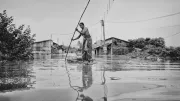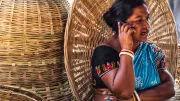Financial services help people to reduce the impact of and to adapt to climate-related risks. Yet women have less access to such tools. This working paper illustrates how women are differently impacted by climate change and how financial services can play a better role in strengthening their autonomous adaptive capacities to climate change.
Rural women are critical to ensuring global food security but disproportionately vulnerable to climate change. In this working paper, CGAP and Mercy Corps AgriFin provide an overview of 10 opportunities for service providers, investors, and donors to improve rural women’s climate resilience and share examples of innovative business solutions.
This deck explores three personas of rural women and their distinct customer journeys through product and service engagement. It aims to provide a deeper understanding of the challenges and opportunities rural women face—including in the context of climate change.
Many low-income people generate rich data trails that are not being fully leveraged in the design and delivery of financial services. CGAP's reading deck puts a spotlight on the specific data trails generated by digitally included yet poor people, the sources of these data trails, and variations of data trails across different segmentations.
Women entrepreneurs continue to face persistent gender-based barriers that impede their success – such as unequal access to financial accounts, constrained credit, and normative roles that keep women in the role of primary caregivers. Improved financial inclusion can help reduce some of these barriers. This WBL-CGAP Brief presents data collected by the World Bank’s Women, Business and the Law (WBL) project on how National Financial Inclusion Strategies can spur policy and regulatory reforms in support of women’s entrepreneurship.





